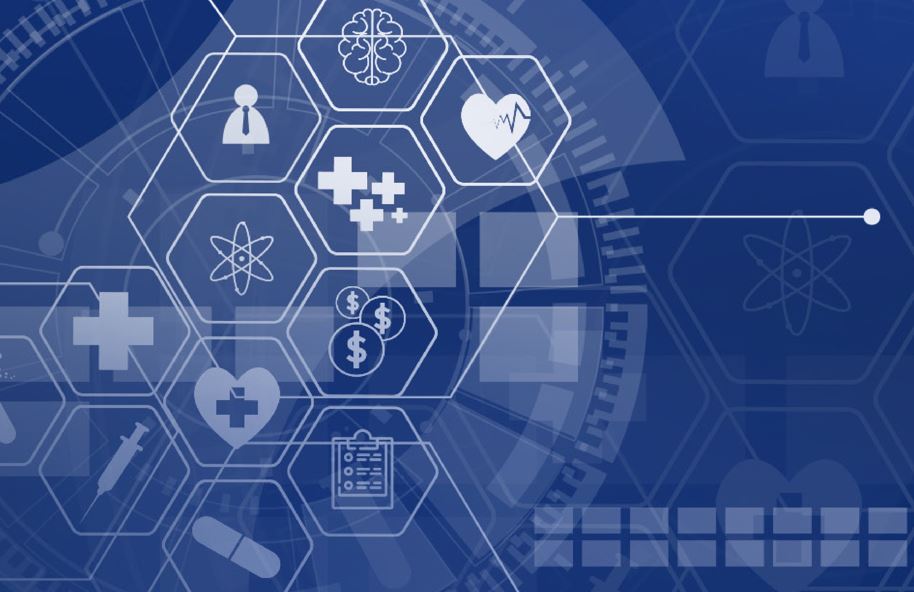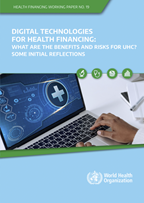Digital technologies in health financing
Why do digital technologies in health financing matter?
Digital health is a rapidly expanding topic of interest for research, policy and practice. Within digital health, digital technologies (DTs) for health financing are receiving increasing attention. These include database and data analysis technologies, mobile telephone applications, webpage interaction platforms, digital payments, blockchain, big data analytics and artificial intelligence including machine learning, among others, that are used to support the core health financing functions of revenue raising, pooling and purchasing services.
DTs change the nature and business processes of health financing functions and tasks and modify the interactions between health financing actors, such as individuals (patients, beneficiaries of health coverage schemes including health insurance members), health service providers, purchasers and the ministry of health.

Benefits and risks
When well designed and implemented, DTs can support and simplify health financing tasks and lead to higher speed and/or accuracy in their execution. This contributes foremost to enhanced efficiency and transparency and more equitable resource distribution, ultimately supporting the final universal health coverage goals. In particular, DTs can help overcome challenges inherent in paper-based data systems and enable otherwise hardly implementable policy options, especially options that rely on near real-time exchange of data.
There are also several positive effects resulting from the emerging applications of artificial intelligence and machine learning in health financing. For example, this can help to reveal patterns in the available data which could otherwise have remained hidden, thus, for example, informing improved tailoring of services and leading to better quality of care and utilization in line with need. Efficiency, transparency and accountability can also increase for instance through automated fraud detection in claims management.
Yet, depending on the context, DTs might also come with negative effects, which will ultimately have an impact on progress towards the intermediate and final universal health care objectives. For example, existing inequities can be exacerbated by digital divides, such as when certain population groups experience more difficulties in using and thus benefiting from DTs, such as mobile phone applications. Caution is also warranted when DTs contribute to a pooling architecture with limited redistributive capacity, an example being mobile wallets for individual savings, without any pooling across people. Finally, insights derived from artificial intelligence and machine learning applications might be misused to exclude selected high-cost patients or conditions from health coverage or to raise insurance premiums. This might worsen or consolidate inequities in financial protection at the detriment of vulnerable and disadvantaged population groups.
Collecting and sharing evidence on the effects of digital technologies on health financing
More evidence and country experiences in using DTs and their effects on health financing functions and tasks are needed to share lessons on what works well and what does not. This will inform policy design and implementation practice and can equally feed into national digital health strategies as well as respective regulatory provisions to maximize the benefits of DTs for health financing. The existing WHO guide with key questions and exemplary indicators to orient such country studies can help generate evidence on the effects of DTs for health financing in a systematic manner.
Ultimately, every application of a DT for health financing requires a careful, context-specific assessment of the benefits and risks. Whether the effects of using a DT will be positive or negative will mainly depend on how and for which purpose the DT is applied in health financing as well as on effective mitigation of the risks.
Publications

Digital innovation for health care and illness prevention with its potential to transform health-service delivery has received strong public attention...
The use of digital technologies to support the identification of poor and vulnerable population groups...
The role of digital technologies for health financing and their potential contribution to UHC progress is receiving increased attention, although...
The implications of artificial intelligence and machine learning in health financing for achieving universal...
While there is an abundance of publications on the application of artificial intelligence (AI) for different areas in health in general, the topic of AI...
Assessing the effects of digital technologies on health financing and UHC universal health coverage objectives...
The use of digital technologies Ifor health financing, as part of the broader domain of digital health, receives increased attention in policy, practice...
The role of digital claims management for Estonia’s health insurance: a leverage for making healthcare...
This study explores how the claims management process of the Estonian Health Insurance Fund has been digitalized over time and illuminates how...
Use of machine learning for fraud detection within the claims management process in the Philippines
Artificial intelligence, and machine learning (ML) in particular, have the potential to support health financing functions and thus may contribute to progress...
Does Indonesia’s National Health Insurance Scheme mobile phone application, Mobile JKN, support health...
In 2014, a national health insurance programme (Jaminan Kesehatan Nasional, or JKN) was introduced in Indonesia, with the objective of improving access...
Using digital technologies to make access to medicines and dental care more affordable: a case study...
This study focuses on the use of digital technologies, alongside changes in coverage policy, to enhance affordable access to health care in Estonia....
The Online Referral System in the state health insurance scheme of Karnataka, India: a digital tool to...
This case study focuses on the Indian state of Karnataka and a particular digital technology, the “Online Referral System” (ORS), which came...
Activities
Related health topics
Related links
Contact Us
